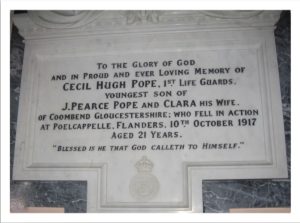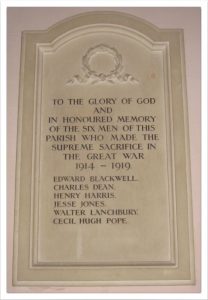Household Battalion

Cecil Hugh Pope was born on 30 November 1895 in Elkstone.
In 1911 he was living with his parents, James Pearce (Auctioneer, Valuer and Farmer) and Clara, his two sisters, Hannah Sophia and Clara May, and his two brothers, Jack and Critch, at Coombend, Elkstone. He attended Cirencester Grammar School for six years.
On 5 November 1915, Cecil Pope enlisted at Cirencester Recruiting Office and volunteered for the Life Guards. A note on his enlistment form records that :
“…he is a farmer’s son and a very smart lad”. Cecil produced two references, one from Harold G Graham MD, Cirencester who stated: “I have known Mr Cecil Pope of Coombend for seven years. He is of excellent character and eminently suited as a recruit to the Life Guards. He is used to horses and is a good rider.”
Following the formal enlistment, Cecil was granted leave until 8 November 1915 when he was to be despatched to the Life Guards’ Hyde Park Barracks in London where he became a Trooper in the 1st Life Guards. His regimental number was 4039.
The initial recruit training was in London but then moved to Smith’s Lawn at Windsor. Following this the recruits were posted to the Life Guards Reserve Regiment at Combermere Barracks in Windsor as replacements and reinforcements for the active service regiment in France which was being held in readiness for open warfare following any breakthrough of the trench warfare.
However, by the summer of 1916 it became clear that open warfare in France was a remote possibility and that the substantial number of cavalry soldiers being held for this purpose could be better used if converted to infantry.
As part of this process it was decided that some 900 soldiers from the three Household Cavalry reserve regiments (1st and 2nd Life Guards, and Royal Horse Guards) should be used to form a new infantry battalion to be called the Household Battalion. Cecil was in the group of men from the 1st Life Guards who were transferred. Some men kept their original service numbers but Trooper Pope became number 499.
On 8 and 9 November the battalion moved to Southampton with Cecil in the first contingent which sailed overnight on the SS Mona’s Queen landing at Le Havre. During the rest of November 1916 the battalion moved across France mainly on foot and was in a reserve position before entering the front line at Sailly-Saillisel on 10 December.
On 6 June 1917 Cecil Pope was promoted to Acting Corporal and was confirmed as Corporal on 1 September.
In September, after several weeks of training and re-equipping, the Household Battalion was transferred to an area north-east of Ypres.
They arrived at Proven on the 20th and after a period of preparation moved forward on 3 October ready for an attack on the 4th.
On the 9th they stood to at 5.30am and moved forward to a support position under heavy shellfire.
On the evening of the 10th they received orders to move to the front line and moved into position ready for an attack on Requete Farm near Poelcappelle.
The route up to the line took them along a lane leading from Schreimboom to Poelcappelle. During this approach they experienced very heavy shelling and sustained 45 casualties of which 14 were fatal. Corporal Pope is recorded as having been killed on 10 October 1917 so it is almost certain that it was here he died.
Corporal Cecil Pope is remembered on the Tyne Cot Memorial and, after the Armistice, his parents obtained permission to erect a plaque in his memory in Elkstone Church.

